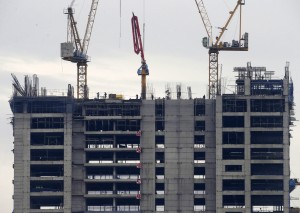
Construction of a high-rise hotel and condominium continues in Manila, Philippines on Thursday, May 30, 2013. The first-quarter Philippine economic growth rate is seen as “remarkable” and a confirmation that the country has moved up to a higher growth trajectory, according to a BPI research. AP PHOTO/BULLIT MARQUEZ
MANILA, Philippines—The first-quarter Philippine economic growth rate is seen as “remarkable” and a confirmation that the country has moved up to a higher growth trajectory.
The gross domestic product growth rate of 7.8 percent for the first quarter surpassed market consensus of 6.1-6.2 percent. It also marked the 57th consecutive quarter of Philippine economic expansion and posted the fastest pace of growth in the region, beating China and the other slowing economies of Southeast Asia.
In a research issued by the Bank of the Philippine Islands, economists Emilio Neri Jr. and Nicholas Antonio Mapa noted that this growth print was “remarkable” as it had come from a strong growth base of 6.4 percent in the first quarter of 2012. As such, the BPI research said the growth ramp-up clearly “demonstrates that the Philippine economy has achieved a much higher growth trajectory.”
“I think that’s very positive. That’s wonderful for the market, for the industry, for all the businesses. GDP is growing so you’ll see equity markets picking up. SDA (special deposit account) is also coming out so that will give a lot of opportunity to many of the product providers, investment providers to be able to develop more the capital markets and increase savings and investments for the retail investors,” said Karen Roa, president of Philam Asset Management Inc.
The BPI research noted that many analysts had doubted the sustainability of the country’s above-6 percent growth prints during all the four quarters of 2012 for the simple reason that the Philippine economy came off a weak base in 2011. That year, GDP grew at a disappointing pace 3.9 percent.
This time, although midterm election years have always resulted in relatively robust GDP, the BPI economists were impressed by the hefty construction growth (+33.7 percent) numbers. “We will be doubly impressed if we could confirm that the public sector played a big part in this as this appeases concerns that the current administration has a tendency to underspend,” the research said.
BPI had expected the first-quarter growth rate at 6.9 percent.
“The Philippines continues to churn out solid growth numbers on the spending side, driven mainly by consumption spending and durable equipment outlays while construction and manufacturing activity on the production side, which is aided in large part by the low inflation environment and low interest rate regime,” the research said.
The BPI research said consumption was also boosted by a steady stream of funding in the form of overseas Filipino remittances flowing into the country, albeit at a more measured pace.
The growth was likewise achieved despite tepid merchandise trade numbers, but the BPI economists said this was to be expected given the depressed global demand and the limited dependence the economy had on export receipts.
With this latest economic report, BPI sees some appreciation pressure for the peso in the near term after its sharp slide in the past week. On Thursday, the peso indeed gained some ground against the US dollar.
But BPI said external sentiment might weigh a bit more the second quarter as the US dollar appeared to be poised for further strengthening across most other currencies.
On the local equity market and Philippine offshore global bonds, BPI said these may be less vulnerable to profit taking as ratings and valuations have not factored in a more than 7-percent GDP growth expansion.
“Foreign players may also take notice as the Philippines has clearly distinguished its economic performance above its regional peers,” the BPI report said.